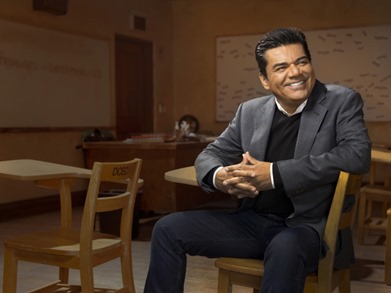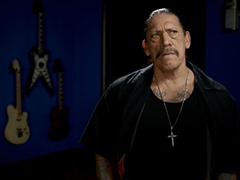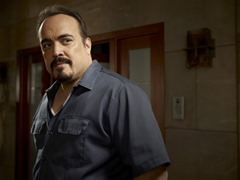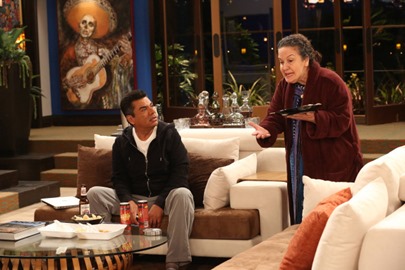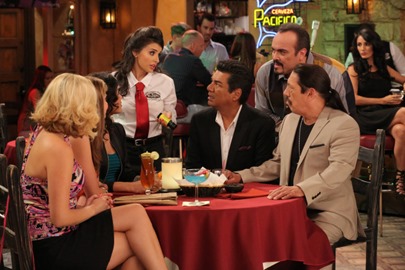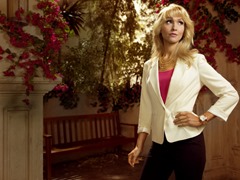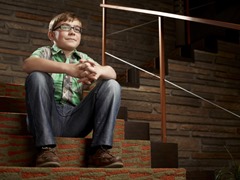Saint George (Thursdays, 9/8C) is FX’s latest half-hour comedy to be produced under the 10/90 model. If the ten episodes that have been produced get the ratings, there will be ninety more. The series, about a recently divorced Latino entrepreneur with a young son, and a desire to give back to his community, premieres on Thursday, March 6th.
Series star George Lopez spoke with a group of bloggers/journalists earlier this week and talked about where the series idea and title came from, why it’s on FX, what he likes about the 10/90 model and a great deal more.
Yes, George, I thought it was interesting that you played a good guy teacher in the show, because I remember in your book I don’t think you mentioned any teachers that you particularly liked, and you mentioned some bad ones. What were your teachers like when you grew up, and why did you decide to play a teacher here?
George Lopez: Well, you know, it’s interesting. I think that a lot of Saint George—and let’s start with the title. You know, some titles make sense, you see Everybody Loves Raymond, you see How I Met Your Mother, Modern Family. Saint George is, needless to say, a pretty interesting title. I think you don’t become a saint until the end of your life, and how you live your life depends on whether you become a saint or not. I’m not sure that in my particular life I will become a saint any time soon, but it is a great title, I love the title.
But also, I think opposites are great for comedy. So, in my particular education, I didn’t have the greatest teachers. As a matter of fact, in the book I wrote about a teacher that I knew was a comedian in high school, and then he actually told me that for him to teach me comedy would be wasting his time. So I actually in my life have used negative things to inspire me to become positive.
So, the show, the guy giving back, we wanted to show that as a way to have a sense of a place where you could go to have specific humor about specific topics, and being a teacher and giving back, which I do quite a bit. That really doesn’t get covered as much. But we thought that that would be a great venue for comedy.
What is it about this particular format that you love? What is it that made you want to do another sitcom, potentially one that will have you doing it 100 or more times?
George: Well, it’s interesting. When I was in the clubs and I looked at guys who were creating sitcoms, you know, Jerry Seinfeld, and Drew Carey, when Drew Carey’s first show was going on, and particularly Tim Allen. You know, Tim Allen had all of Home Improvement in his stand-up, and clearly you could see that there was a show there.
With my stand-up, I didn’t particularly have a focus or a particular point of view until around ’96, when somebody who works for 3 Arts, who represents me now, told me that I probably needed to become a little bit more focused on a couple of subject matters. And then I decided to focus on family and cultural differences, and then five years later we started working on George Lopez with Bruce Helford who had done Drew Carey, and through that kind of experience with him—because he had worked on Roseanne and he had created Drew Carey, that he was great at turning the stand-ups into TV shows.
So that worked for me, and that was really a very educational, a good time to learn. A lot of comedians were still on TV, Raymond and Kevin James, and Damon Wayans was on, and Will & Grace was still on, Seinfeld was coming to an end, I think Frasier might have even still been on. So it was a great comedy time, and then when I finished the first show, I did the talk show, and that actually is probably the hardest work that I think an entertainer could have in TV, because it’s every day, and it’s very difficult.
But getting an opportunity to work with the guys who created Tim Allen’s show—I had a deal at Lionsgate, and then they signed David McFadzean and Matt Williams—so that sparked my interest because it all comes from the guys that I admired as show runners. So, to create the first show with Bruce Helford is an honor, and to work on Saint George with Matt and David is something that I didn’t expect, and I think the show in the ten episodes is really good, and the cast of actors is great. And it’s funny because people say, well, you know, you have 10 shows to try to get 90. But in the first show, my first order was only four episodes. So, I like what we’ve done with Saint George. I think the people will like it, and I’m excited about Thursday.
Okay. And you’ve got to love Danny Trejo. How cool is it to have him on board?
George: Yes, you know, initially that character was a friend that I have, a guy named Vern. He’s kind of like a right-hand guy, and when we pitched the show to FX, they didn’t like that he was a friend, they wanted him to be a relative. And I started to write a relative that I had, an uncle that I had that was very competitive with me, and that my grandmother, it was her oldest son, that she thought he could do no wrong. And I thought that was a good place to be, because he has never worked in his life, he’s covered with tattoos, he had been in prison, and yet my mother hangs on his every word.
So I thought that would be a great place—and, you know, Danny Trejo hadn’t done any multi-camera. Forget about the regular schedule of multi-camera, but the 10/90 multi-camera is twice as fast. So I remember Danny saying that usually he would stand there and scowl, and the camera would come in on his face, and he would say, I’m going to kill everybody here. They would yell cut, and he could go to his trailer.
I was just wondering, because you’ve been very busy with films, how did it feel to get back on to TV with a sitcom again?
George: Yes, I was doing a nice run of films after the sitcom was over, Valentine’s Day was good, and then there were some other movies. But the actual—like they always say, the waiting around, I think some great actor had a quote that, “I do the acting for free, but they pay me to wait.” And it is, for me, the waiting was really very difficult.
I did a movie with Jackie Chan, and this is where I made my decision to go back into TV. I made a movie called Spy Next Door with Jackie Chan, it was in New Mexico, and it was freezing. Half of my trailer was warm, and half of it was cold, but the cold part was the part I got dressed in. So, in that trailer while I was waiting for Jackie Chan to beat 15 guys up in a warehouse, I decided that maybe waiting around in a trailer wasn’t particularly good for me, particularly. For everybody else, hey, that’s cool. But for me I decided that I always liked TV. I like the immediacy of TV. I think it’s an honor to be on TV, and I’m excited about actually getting another opportunity with such a great group of actors. These actors are all very, very good.
And I was wondering if there was a chance we’d be seeing any familiar faces from George Lopez?
George: I think past the 10, if the show continues into the back 90, I would love to revisit some of the characters. You know, the father-in-law character, Emiliano Diez, was a tremendous well of comedy. And then the mother character, Belita Moreno, was fantastic. So I think mothers meeting each other and becoming friends for an arc would be great, and yes, they’re all great actors, so I’ve been blessed in the arena of TV to be surrounded by really, really good people.
Hey, George. I was wondering where you found Olga, the lady that plays your mother? Did you see her in like In the Heights, or anything like that, from her Broadway stuff?
George: Yes, you know Olga was I believe in the first full season of George Lopez, the ABC show. She played my father’s sister, and she just appeared in one episode. But yes, we had seen her In the Heights, and she was tremendous.
We had had another actress in that part, and Olga came in and took over the part for her, and made the show so much better, so much easier for the other actors to work in. So yes, when she was there—because we already had all worked together before. But Danny and David and Jenn Lyon and myself, all really are very fond of Olga, and looking forward to continuing to work with her.
Yes, she was very funny from what I saw. I want to say, your stand-up in Chicago was so great. I just got to see your show not too long ago, and you’re just really funny. So come back.
George: Thank you. Yes, the stand-up has been a tremendous wealth of a place to take personal experiences, clearly, and bring humor to them. So I appreciate that, thank you.
So, I want to know what’s wrong with George. Why doesn’t he want Concepcion? I mean, she’s everything. Like, que la pasara manito, something?
George: Yes, that’s a really good question. The thing about Saint George that, if you see the 10 episodes, the first show—I’ve succeeded in becoming very honest about my life. And the first George Lopez was a lot to do with an absent father and an overbearing mother. I don’t think an overbearing mother ever really gets better. If you have an overbearing mother, I think you’re going to have her until she’s not around anymore. So, revisiting an overbearing mother in this show made a lot of sense to me, because I don’t think we were done with anywhere near where my grandmother got to, as far as our relationship went to.
I think this is a great extension of that first show, in the relationship. It’s a little bit edgier, it’s a little bit harder on me, but George on the show, much like myself, has issues. He has issues with the divorce that he’s trying to resolve, he has issues with his child on the show that he’s trying to resolve. And I believe that, for me, the more honest that I can be in the creation of it, I think the funnier the stuff is.
But Concepcion is a beautiful woman, she’s in charge of her body, she’s very sexual, she’s very curvy, she’s a beautiful Latina woman, and in the show, much like in life, it would intimidate me to be with a woman who’s that secure in herself and that positive about what she wants. So, I thought that in creating that character it would be a great place to show, because sometimes the man is more assertive, and in this particular relationship, I am not. I don’t really know what I want. I don’t know where my life is going. I just got divorced, my mom has moved in with me, I’ve got an uncle and a cousin that try to tell me how to live my life. I’ve created a success for myself, and still sometimes in success you don’t expect it, and it’s not necessarily the most comfortable place to be. And I think that area is good for comedy.
Now, in the first episode, we see George being put in an uncomfortable situation, trying to deal with the single’s scene, and a little birdy told me that there’s going to be something to do with like a prostate exam that’s coming up. So, is the point of every episode going to be to put George in uncomfortable situations?
George: Well, I think that the little birdy should have told you that it’s not George’s prostate that’s getting the exam. So, it happens to be Danny Trejo’s.
He’s the one, he’s the birdy.
George: Yes, he’s the one that’s getting checked, and he’s never been checked. So, in our culture—and in life, not necessarily culture, but I think that guys don’t particularly take the best care of themselves. I know sometimes that I don’t take the best care of myself. I think that every day we should try to take care of ourselves and not be our own worst enemy. Sometimes I’ve been. But in creating the Trejo character, he’s almost like an alter ego of George. So there’s a good George and a bad George, and sometimes bad George wins.
Thanks for taking the time to talk to us today, George. Your stand-up is wonderful, I love watching clips and stuff like that of your stand-up. How hard is it, or what’s more enjoyable for you? Because with the stand-up you get immediate reactions, you get laughs, whereas the TV show, now you’re waiting to see how other people are going to see what you’ve filmed weeks, months ago. How do you approach each one differently? And between your movies, your charity work, your stand-up and TV shows, what is George’s real passion?
George: Yes, that’s a good question. You know, I’ve been doing stand-up a long time, and I continue to do it, clearly; I did it last weekend in Canada, in Windsor, a great show. And as experiences happen to me, I’ve always found a way to make humor of them. And in serious situations, too. So, stand-up has been a great outlet for that.
I don’t particularly know where I would be in my life without stand-up, because I’ve been doing it since I was 18, and never really disconnected from it. So, it’s been a great partner to have in life, and always been an outlet for the truth. I think Richard Pryor handled some of his personal issues on stage. I got a message from Jennifer Pryor, Richard’s widow, a few messages this weekend about what Richard would do, and all very supportive, and very funny, clearly.
But the platform from the stage to TV is a great stepping stone. Clearly, a lot of the stand-up comedians have turned into great—you know, Robin Williams and Billy Crystal and Jackie Gleason was a tremendous actor, and Allan King back in history. So, I don’t mind the actual wait of taping. We used to tape in front of a life audience. Saint George isn’t in front of a live audience, but the crew is about 100 people, so you do have 100 people around you.
I think the natural progression for me from stand-up is TV, so to continue to do this show for another 90 or plus—FX has been great to the show, I love that this is edgier than the first show, and I’m excited about who’s involved in the show, actor-wise, and about tackling some bigger issues into the back 90.
How has the landscape of television sitcoms changed since George Lopez first aired? And are you still as competitive as you were when you first started out?
George: I think the landscape has—you know, there’s been a lot more single-camera, you know, The Office, Modern Family has had some success. There’s also been Big Bang Theory, multi-camera, How I Met Your Mother, New Girl is single camera. There’s been a balance more of single camera and multi-camera, but back in the first show the single camera was foreign to TV. So that’s succeeded.
I think also back then there was much more reality. Like toward the end of my first run, reality TV was huge. Everything was reality TV, and it’s not as much ten years later, as it was ten years ago. Yes, so those are some of the changes that I’ve seen.
And when you look at your career up until this point, what are you most proud of?
George: When I look at my career up and to this point, I think the thing that—you know, there hadn’t been a successful show with a Mexican-American star, I don’t believe in the history of TV. You know, Freddie Prinze was Puerto Rican, and Gary and then Desi Arnaz was Cuban, so as far as a Mexican-American, there had not been one. And it was named after me; those guys, their shows weren’t named after them.
But I think of getting the star on the Walk of Fame the day of the 100th episode, when a show really hadn’t gone past three episodes previous to that, is one. It’s hard to pinpoint that actual proudest thing, but one of the things I’m proudest of is having a star on the Hollywood Walk of Fame, because as a 15-year-old I would go to Hollywood and we were walking through the stars, and clearly everyone imagined their name there, but no one ever thinks that that’s going to happen. So that’s been a pretty great thing.
I had something else, but I want to follow up on something first. When you do the 10/90, you did the 10 over how many weeks? And how much time would you have to do the 90 then?
George: Yes, we did the 10 over—I believe it was—there was two a week for, it might have been 12 weeks, with a couple of weeks of preparation. But we wrote it, Matt and David and myself wrote it for probably five months, and pitched it, and then we started writing in May, and then shot it in August and September. So that was all of last year, and then we had some re-shoots to do earlier in January, which I think we made the show clearly better as actors, as well, to go back and redo some of the stuff the first time, which was a great opportunity to have.
But Charlie Sheen is in his 90, and they’re probably at about close to 60 now, and they’ve been at it for, I’m not sure, about a year and a half. I think it probably takes two and a half years. The 10/90, it’s an interesting thing. You know, Tyler Perry’s had success with it, and Ice Cube had some success with it. There has been successful 10/90s, and Martin Lawrence and Kelsey Grammer are working on a 10/90 as well. They were working on theirs when I was re-shooting mine in January.
But the higher the profile of the actual cast, the better the run at the ten. So, I like having Danny Trejo in it, and David Zayas who is just coming off Dexter, and Diana-Maria Riva who was on The Bridge. I kind of looted FX for some people that they had on different shows. You know, Jenn Lyon did a great job on Justified, so in looting FX and pulling a couple of people off Broadway, and David had a great run on Dexter, I feel good about my run at ten.
Alright. Well, I wanted to ask you about looting Jenn Lyon. That was the other thing I was going to ask you, because you kind of mirror your life in some ways. The old series you were a married guy with a family, the new series you’re a divorced guy. But the one difference you do from your life is you have this very waspy ex-wife. How did you decide to go that way?
George: Well, you know, culturally—comedians, culturally, it doesn’t define the whole culture. It’s kind of a plus or minus. But in the culture that I come from, the Mexican culture, it’s always been a reward to marry someone who’s been white. Not that it’s bad to marry anybody that’s Latina, but when I was in high school, there were very few white women around, and when you saw one, they did kind of gleam.
I didn’t have much success with white women in my life—or with any women in my life, to be honest with you—but that’s what makes Saint George great, is that I will explore my imperfections, which should probably take me past the 90, but in making her really waspy, I wanted to because I’ve noticed in the last ten years, also, that people that come to the show are not particularly of one kind with each other. That as a society, we’re much more blended, and kids look different, and lifestyles are different, and the fact that gluten now is around, and allergies are around, and helmets are around, that I thought the progressive culture and a kind of culture that is the walk it off, why are you crying culture would be a great place to create a show from.
I was wondering, I know you said the 10/90 thing, how many episodes have you already filmed? You’ve just filmed the ten?
George: Yes, we just shot the ten. They’re really kind of ten—I wouldn’t say an arc, you don’t have an arc in ten, but there are some things that continue to pop up in the ten that give people an idea of what the 90 would be like. But each one of the ten is a different topic, almost like ten different pilots.
The one that we shot that was going to be the first episode, was one that Matt, David and I wrote, called “Why Can’t We Be Friends,” and that’s not going to air as the first episode. But also, all of those ten episodes, because I am such a fan of classic rock, all ten episodes are named after classic rock songs.
Oh, cool. Yes, because you and I are the same age, I just realized.
George: Yes, so there’s “Carry On Wayward Son,” and there’s “Won’t Get Fooled Again,” about dating. I think that’s actually the one that’s airing Thursday, it’s called “Won’t Get Fooled Again.”
Okay, cool. And I was wondering, between being a stand-up comedian and your sitcoms and everything, you’re often pulling things from your real life, and your family and friends. Does anyone in that group, your real life family and friends, ever complain about things that you have the characters do? Or incidents in real life, anything like that?
George: Yes. I’m not going to tell you who, I think anybody could figure—you don’t have to be a CSI detective to figure out who would be upset. But clearly, you know, I have to be honest with everybody that’s listening. There’s not going to be a lot of things that I say about people in my private life that are not going to upset people in my private life. But also, it’s what has driven me from the time that I first stepped on stage in 1979. So it’s not going to change because of last weekend, and it will not change creatively for me, as long as I either do stand-up, or am honored to be involved in television.
So, 1979. So were you in high school, or just out of high school when you first stepped on stage?
George: I actually was getting ready to graduate from high school. It was June 4th of 1979, and I didn’t graduate until the 18th so, yes, I was still in high school.
Well, cool. I graduated in ’79, too. Alright, ’79 rules. Alright, thanks very much.
George: That was a good year, thank you.
George’s ex-wife is still very much involved in his life. To move forward, will he have to cut back on their relationship, because I’m sure it’s complicated since they share a son?
George: Well, the child on Saint George, you know, the wife is asking George to be more of a parent in divorce than he was when he was married. So Harper—great name—is 12, so by the time he’s 18, she’ll be around, bringing him around, and then he’ll be around and she’ll be around.
I don’t think that because a relationship ends and there’s a child involved that the other person particularly disappears. And in Saint George, Mackenzie will be around in the future to be a place where—you know, she has a healthy life, she’ll date and move on, and then I’ll have to deal with the fact that my ex-wife is dating and has a happy life, and then I’m stuck with my mom and my uncle and my cousin. It already sounds unhealthy.
Yes, because in the first episode we see how he’s trying to get back into dating life and all that, but he’s talking to her about it, and that’s his ex that it seems to me like he hasn’t fully gotten over, and he bumps into her at the bar, she’s like oh, come and sit with us, and you’re like on that side, whether or not he should cut back on his relationship with her.
George: Yes, he probably should, but she’s in a healthier place. She just started to date, and she’s a little bit jealous as well of him, you see it a little bit. But you see her moving on, and you see me not really knowing where to go, as far as dating.
I think one of the lines that sticks out to me is that those guys, Danny Trejo says, come on, let’s go to the club, El Sueño, there’s like all these young girls there. And then you see a lot of older dudes with younger women, and I said, “We’re old enough to be their fathers,” and he goes, “I know.” And I said, “It’s disgusting,” and he said, “Well, we have to give them something to regret.” So it’s a little bit—you know, I saw a guy who was older with a younger girl on an airplane to San Francisco, and it did strike me as not looking the healthiest.
So earlier you were saying you really enjoy working on TV. I’m wondering, do you enjoy watching TV, and if so, what shows?
George: Yes, I spent a lot of time when we were creating this show, and even after my first experience on TV, I wasn’t particularly a huge fan of TV. I’m coming back around. It’s almost like, you know, if you really kind of found out what was in a hot dog, you wouldn’t necessarily want to eat a hot dog? So, the first experience going through that, it does come to light what a business this is. And it’s eye-opening sometimes.
So, coming back around and watching TV again, I was a huge fan of The Sopranos and Breaking Bad, absolutely Breaking Bad. Everybody was telling me about Ray Donovan, that it would be a show that I would particularly like. And it’s interesting, I was on a plane back from Detroit and I watched I think four episodes of Ray Donovan, which is a really, really good show. So there’s always been great shows, but I think right now with networks like FX, you know, Justified and Sons of Anarchy and comedy being a little bit edgy, Louie was very edgy, that on the scope of network TV and cable TV there are some really good shows out there.
We covered this a little bit before, but how would you say Saint George differs to your other work, like on George Lopez. Like in particular, what would you say to those who maybe didn’t watch George Lopez, to get them to tune in to Saint George?
George: Yes. Well, first of all, one was a network family show on ABC. And this one is a cable family show on FX, and there’s no real similarity as far as—you know, I had a guy, who was a great guy, who was the standards and practice guy on ABC. And he’d always run down and tell us what we could say and couldn’t say, and cover up a logo, and you couldn’t do this, you couldn’t do that. And on FX on this show the humor is a lot edgier, a lot of the shows are edgier, I think society has gotten a bit edgier, with social media is edgier. And this show mirrors probably where we are in society right now. It’s a little bit edgier, it’s diverse.
Modern Family succeeded with having a very diverse group of actors, not necessarily ethnicity wise, but as well as ethnicity; how they behaved and who they were in life. So I think this has a lot of the elements of that. So, I think people would enjoy this show. It might be a little shocking with some of the stuff, but FX, their slogan is fearless. I wouldn’t say this was necessarily the craziest show on TV, but it is a lot different than my first one.
You had mentioned earlier that you’ll be tackling some bigger issues as the show goes on, and I was curious if you could talk more about what those issues are, and how you plan to approach them?
George: Yes, well the issues that are in the first ten is clearly getting a divorce and having to move on with where you were, where George is at that particular time, dealing with a child that he didn’t spend too much time with because he was working. There’s an aspect of the mother continuing to be hard on him.
I’ve known relationships with friends, whose mothers still try to tell them how to live their lives, even as full grown adults and men, which I always found interesting, that they always listen. And with the uncle who is a kind of a bumbling guy, who’s very close to his son in a kind of—not a traditional way, but you can see that there’s a lot of love between these two characters.
So, between losing love and seeing a father and son relationship, and being ridden hard by his mother and trying to tell him how to run his life, and always being very negative, George will have to find a place that’s peaceful to him. So to mirror the real life, me like everyone else is trying to find peace, and sometime it’s not always the easiest thing to find. It doesn’t make us bad people, it just makes us flawed, and I think as humans we all have flaws, and how you respond is a great way to live a better life.
I’m not sure that a comedian should be a role model, because we’re so loose with language and with situations, but as a person, much like I would want George on the show, I want the real George to be able to finally find a peaceful, healthy place in his life.
I’m wondering, the 10/90 model didn’t really exist as an option for you the first time around with ABC. Doing the show for FX, what kind of advice did you get from other actors or people behind the scenes in terms of how to approach a 10/90 model successfully?
George: Yes, it’s interesting, and that’s a good question because Charlie Sheen, you know, Anger Management is created with Charlie and those guys, but also Bruce Helford is Charlie’s executive producer, he is his show runner. And Helford was my show runner on George Lopez. So he’s been great, and his template for the way that Charlie does his show has been helpful to the way that we did Saint George. So, I was fortunate to have the guy that I created my show with create Charlie’s show, and only be a phone call away.
But also with my own creators, Matt and David have guys that had just written hours—I mean, Matt worked on Cosby, he created Roseanne, and he created Home Improvement. So pedigree-wise, as far as creators and people around comedy, I don’t think I’ve ever been in a better situation. I don’t think a comedian could be in a better situation moving forward into a new format, with an old kind of sitcom thing that people are familiar with. But the 10/90 model was something that we didn’t bump up against at all.
And on the other hand, have you been able to give any advice to any of the dozens of people who are now in late night TV?
George: Oh no. Those guys, listen. I enjoyed my two years, it was very difficult, but I had some great guests and if you look back on some of those things, Kevin Hart was really just kind of popping at that time, and he was tremendous on the show. Ken Jeong, and I had Prince on the show. I had a tremendous band.
I miss the actual on-stage part more than I miss the behind-the-scenes part, dealing with what I could say and could not say, and do all of that. But the band was tremendous, and the guests were amazing, and the audience was, I think, one of the more diverse and bigger audiences. I think there were 500 people that even now, considering that late night has.
But Jimmy Fallon’s off to a great start, and that’s great. Seth as well, and Jimmy Kimmel’s doing great. So, it’s a tough thing, there’s a lot of traffic, but all of those guys seem to be finding their own place.
Would you rather be sitting at home, wondering about the ratings for Saint George, or Lopez Tonight at this point?
George: At this point, I like my ten shows on Saint George. It gives me more flexibility as well, as a private person, to do the things that I enjoy doing. Working every day like that was very limiting as far as what you could do and how you spent your time.
Golf season is always just right around the corner.
George: Okay, I played yesterday.
I was thinking, you know, sometimes guys are just subconsciously intimidated when they’re around other guys who are tougher than they are or bigger than they are, and I was wondering two things. First of all, if that was true of you when you were a kid and wanted to seem fairly tough and so forth? And what’s it like nowadays, to be constantly around a guy like Danny Trejo, who is really, really tough in real life? Or a guy like David Zayas who plays a tough cop so well. Is that intimidating in some way?
George: You know, that’s a really good question. That’s a good question. When I was growing up, I didn’t have a father figure, and my grandfather was not a bad guy. He had some demons, as well, he wasn’t my biological grandfather, but he was my grandmother’s second husband. He drank a little bit, I saw that growing up, and he never had kids. I think our relationship suffered a little bit in that, but I started playing golf in 1981, and I have played since 1981. It’s always been a great outlet for me, but it doesn’t take the place of a human being.
So, I’ve never really had a system of a man in my life that I could communicate with when I had issues, but I’ve talked to Danny Trejo, who is Machete, and is intimidating with tattoos, and he spent time in prison, but also he hasn’t had a drink in 45 years. And David Zayas, who plays a tough cop, is one of the sweetest guys that I’ve ever met. So I’ve talked to Danny a couple times over the weekend, and to move forward in Saint George and into the back 90, and think that I would for the first time be around a couple of guys who would actually be useful to me in my private life. So, I look forward to spending a lot of time with Danny in the near future, and getting some guidance from him would be fantastic at this point.
You told why you came back to television, but how did Saint George come about?
George: That’s a good final question. I was born on April 23rd, and April 23rd is Saint George Day. So, when I was born, my father left when I was two months old, and I think my grandmother knew that he was not the greatest guy to be around, for my mom. So he left when I was two months old. I don’t think they wanted to name me after him, so my grandmother was always big into the bakery calendars, the bakery calendars that when you went around Christmas and you got some bread and stuff, they gave you a calendar every year. And she would always have that in the kitchen where she put her make-up on. And all of the days, a lot of them are named after saints.
So I think that the day that I was born, she knew that it was Saint George Day, and decided to name me George. So knowing that story growing up, I’ve always had Saint George in my head, growing up. I don’t live, clearly, as much of a saint, but who does really? So it’s always been around, and I always found it to be a great title. Saint George. The prince in England, the future king is named George.
I bought a house in Los Angeles, the first house that I purchased after my divorce, and it’s an older Spanish-style house, and I had some work done to it. And the fireplace was really kind of dirty and sooty, and I wasn’t sure what I was going to do with it, and I actually was thinking about tearing it out. So I asked the contractor, I said, listen, I’m going to tear this out. And he says, well, the fireplace is old, let me clean it up.
So he sandblasted the inside of it, and on the inside of the fireplace, and it’s been there for over 60 years, is an emblem of Saint George, in the actual fireplace. So it’s funny that being born on Saint George, always having it around, and living as I do, and then finding that in the fireplace, it’s powerful. So I like my chances for the show, and in the future.
Okay. Now, if you get the 90 episode pick up, do you think you have 90 classic rock songs to name the episodes after?
George: You know, that’s a good question. I think that there’s a wealth of them, but we may have to bleed into the disco era of the early ’80s to mid-‘80s.
And one last question. Can you preview the remaining nine episodes, since we’ve only seen one?
George: Yes, let’s see. There’s an episode of—well, that’s hard to do actually. Let me go by the titles, and then we’ll see. So there’s “Carry On Wayward Son,” where my mom has an accident in the house and I decide to go play golf instead of taking care of her. There’s one called “Superstition,” where Danny Trejo has to go to the doctor because he’s never had an exam. He’s having difficulty urinating. That one’s called “Superstition.” There’s one called “I Wish,” which was a great Stevie Wonder song—I only know them by the actual song titles—that one is about a birthday party for the son, cultural differences in a birthday party. There is “Hot Blooded,” where I meet a woman who is much like my ex-wife, a successful person, an individual who runs a cosmetic line, and that doesn’t work out well for me. There’s “Why Can’t We Be Friends,” which is the first one, and it’s really about the mom and her issues with people of different races, and then you see me going to the school for the first time.
What else is there? Yes, those are the ones that I can remember.
Okay, I can’t wait to see those.
George: Oh, there’s “Hit Me With Your Best Shot,” which is about disciplining your child. Yes, there’s those. That might be close to ten.
Okay. “Hit Me With Your Best Shot,” is the ’80s, but that’s okay.
George: Oh, it is? No, I think it might be the late ’70s.
Oh, okay. Cool, thank you very much.
George: Thank you.
Photos by Matthias Clamer and Byron Cohen/Courtesy of FX
